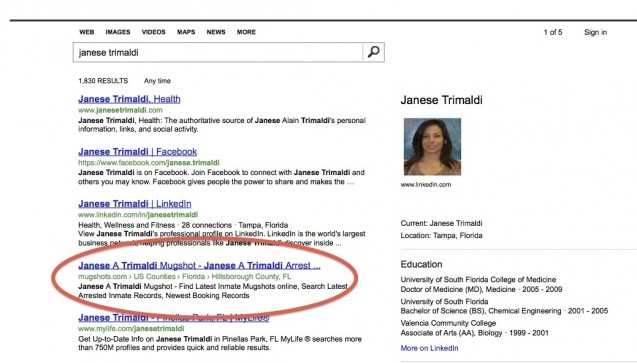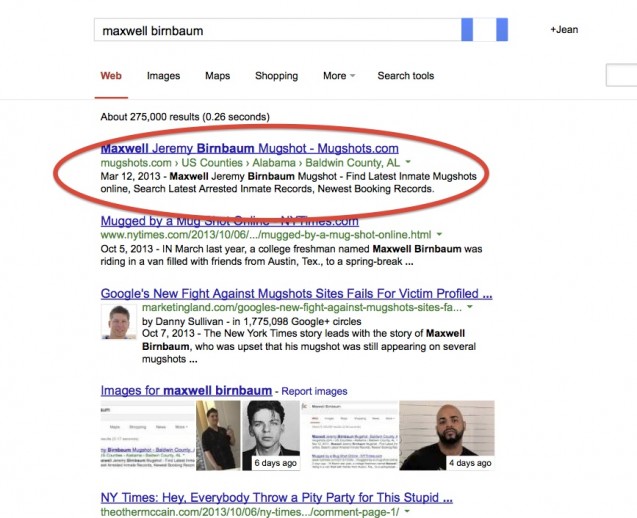A recent New York Times article really shook things up for the owners of mugshot websites. In a remarkable piece of investigative journalism, the reporter started asking some hard questions, including:
- How do mugshot sites, which contain only copied documents, rank so high on Google, when they should fall to the bottom of the pile?
- Why do credit card companies accept payments from companies others accuse of extortion?
Even though these questions had been asked before, for some reason, the fallout from this particular article was extreme. Suddenly, Google announced an algorithm change that would penalize the sites, and quite a few credit card companies (along with PayPal) also promised to sever ties.
While people weren’t exactly dancing in the streets over this news, many were a little giddy. Some experts were convinced that this article would mean the end of a problem that most people (including me) consider distasteful, if not out-and-out disgusting.
Even mugshot industry executives got a little worried about the changes, and they wrote tortured blog posts about how the downgrade in Google would put the safety of all Americans at risk, as well as damage the credibility of Google itself ( you can see the whole entry here, but be warned that it’s long).
The reality has been a little more complicated, however. And it’s important to get the facts straight, particularly for those of us who work in the SEO and reputation management business. If we don’t understand how these sites work, and how they might continue to function when the landscape around them changes, we won’t ever be able to help our clients.
Stalemate on Payment Changes
First off, while many credit card companies claimed that they’d stop taking payments from these sites, many mugshot websites are still processing plastic. Two of the three mugshot websites I visited this morning still have credit card icons right on their home pages, and others still have big “Record Removal” buttons next to mugshots.
Now, that might change, as banks might need time in order to sever their ties. Providing a 30-day notification prior to the severance of a business relationship is pretty common, so perhaps these mugshot sites will be dumped in the future. But it’s also possible that the credit card companies have no intention of changing their plans at all. Research conducted by CNN suggests that some credit card companies are only reviewing their options, without actually planning to cut ties in the moment. Maybe the funding isn’t so tenuous after all.
Similar Search Results
The issue of Google page rank is thornier, and there’s no question that the change had some sort of impact. For example, one woman mentioned in the NYT piece (Janese Trimaldi) had a mugshot on Page 1 of her Google search results prior to the story’s publication. Now, that same link is on Page 10 to 12 of search results, depending on what terms the searcher uses.
Most SEO experts would agree that Page 12 looks a lot like Siberia. No one is going to look that long and that hard for someone’s vital data. However, her mugshot still isn’t gone. Search for “Janese Trimaldi mugshot,” and her photograph is on Page 1 once more.
Also, the Google change (obviously) does nothing for Bing searches. A search run for poor Janese there shows her mugshot right up top.

I know we’re all taught to think of Google as the big, bad everything that dominates Web search, but Bing is far from a non-entity. It’s still there, and it’s still used.
Perhaps more disturbingly, the Google fix didn’t erase the problem for everyone mentioned in the NYT piece. In fact, one man mentioned in the article has his mugshot right at the top of search results, just as they were prior to the publication of the article.

In fact, since he was mentioned in a public article about mugshots, his photo is even more prominent now than it was before he sat down with a reporter.
Client Takeaway Point
When a client comes to us with a mugshot-related concern, we’d do them a disservice to suggest that the photo is just part of the last gasp of a dying industry. While the sites got a shock, they’re still operational and the damage they can do is still real.
Also, I have no doubt that sophisticated SEO techniques could raise the profile of these sites once more. They may be at the bottom of the heap on Google right now, but there’s no guarantee they’ll stay there, and as Bing grows in popularity, the reputation risk of an untouched mugshot grows more and more extreme.
That’s why we continue to suggest record removal for our clients. The sites aren’t gone, and I’m not sure they’ll ever go. Why take the chance?
Featured Image Credit: Sattva via FreeDigitalPhotos.net




